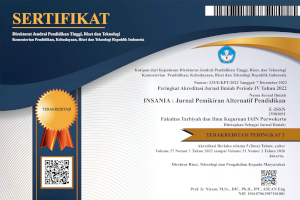IMPLEMENTASI STRATEGIS MANAJEMEN SUMBER DAYA MANUSIA PERSPEKTIF AL-QUR’AN
DOI:
https://doi.org/10.24090/insania.v25i2.4185Keywords:
Human Resource Development Management, Al Qur’an and HadithAbstract
Indonesia is predicted to experience a demographic bonus between 2015 and 2035. With the abundance of productive human resources, Islamic education institutions must be ready to manage their human resources with the right strategy to implement. Management of human resources from Al-Quran's perspective is the right choice in an Islamic educational institution, and this management has been implemented in integrated Islamic schools. In this research, a case study will be taken at SDIT Insan Cendekia Boyolali, which is considered useful in implementing human resource management. The implementation carried out by SDIT Insan Cendekia Boyolali starts from four management components: 1) Planning, 2) Organizing, 3) Controlling, 4) Actuating has implemented Al-Qur'an perspective management. Likewise, in the implementation of the principles of human resource management, namely: 1) The principle of monotheism, 2) The principle of justice and welfare, 3) The principle of deliberation, 4) The principles of efficiency, effectiveness, and productivity, 5) The principles of discipline, integrity, and loyalty, 6) The principle of division of authority and responsibility, 7) The Ukhuwah Principle. There are still some deficiencies in the implementation, but educators can already felt the results.Downloads
References
Astuti, Efi Tri. (2019). Prinsip Manajemen Tenaga Kependidikan Perspektif Al-Qur’an. Jurnal Iqra’: Kajian Ilmu Pendidikan. 4(1), 128-145. https://doi.org/10.25217/ji.v4i1.465
Falikhah, Nur. (2017). Bonus Demografi Peluang Dan Tantangan Bagi Indonesia. Jurnal Alhadharah: Ilmu Dakwah. 16(32), 1-12. http://dx.doi.org/10.18592/alhadharah.v16i32.1992
Hartani, A. L. (2011). Manajemen Pendidikan (S. Purba, Ed.). (http://digilib.unimed.ac.id/1614/)
Ikhwan, A. (2016). Manajemen Perencanaan Pendidikan Islam (Kajian Tematik Al-Qur’an dan Hadits). Edukasi: Jurnal Pendidikan Islam, 4(1), 128–155.
Kamuli, S. (2012). Pengaruh Iklim Organisasi terhadap Produktivitas Kerja Pegawai di Sekretariat Daerah Kota Gorontalo. Jurnal Inovasi. 9(1), 1-8.
Laili, Syarifah. (2016). Studi Analisis Ayat-Ayat Ukhuwah dalam Tafsir Al-Mishbah Karya Quraish Shihab. Tesis, Fakultas Ushuluddin. Medan: Universitas Islam Negeri Sumatera Utara.
Muhab, Suko, et al. (2017). Standar Mutu Kekhasan Sekolah Islam Terpadu. Jakarta: JSIT Indonesia.
Pratiwi, Umi. (2014). Integrasi Pendidikan Agama-Sains Berbasis Eksperimental Untuk Membentuk Character Building Mahasiswa. Insania: Jurnal Pemikiran Alternatif Kependidikan. 19(2), 359-384. https://doi.org/10.24090/insania.v19i2.720
Ramdhani, M. A. (2017). Lingkungan Pendidikan dalam Implementasi Pendidikan Karakter. Jurnal Pendidikan UNIGA. 8(1), 28–37.
Salam, A. (2014). Manajemen Insani Dalam Pendidikan. Yogyakarta: Pustaka Pelajar.
Setiawan, A. (2014). Prinsip Pendidikan Karakter dalam Islam: Studi Komparasi Pemikiran Al-Ghazali dan Burhanuddin Al-Zarnuji. Dinamika Ilmu. 14(1), 1–12. https://doi.org/10.21093/di.v14i1.4
Suti, M. (2011). Strategi peningkatan mutu di era otonomi pendidikan. Jurnal Medtek, 3(2), 1–6.
Downloads
Published
How to Cite
Issue
Section
License
Authors who publish with this journal agree to the following terms:
Authors retain copyright and grant the journal right of first publication with the work simultaneously licensed under a Creative CommonsAttribution-ShareAlike License that allows others to share the work with an acknowledgment of the work's authorship and initial publication in this journal.
Authors are able to enter into separate, additional contractual arrangements for the non-exclusive distribution of the journal's published version of the work (e.g., post it to an institutional repository or publish it in a book), with an acknowledgment of its initial publication in this journal.
Authors are permitted and encouraged to post their work online (e.g., in institutional repositories or on their website) prior to and during the submission process, as it can lead to productive exchanges, as well as earlier and greater citation of published work (See The Effect of Open Access).








